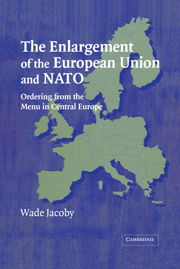Book contents
- Frontmatter
- Contents
- List of Tables, Graph, and Figures
- Preface and Acknowledgments
- Introduction: Ordering from the Menu in Central Europe
- 1 Emulation as Embedded Rationalism
- 2 Emulation as Rapid Modernization: Health Care and Consumer Protection
- 3 Emulation Under Pressure: Regional Policy and Agriculture
- 4 The Struggle for Civilian Control of the Military
- 5 Military Professionalization in War and Peace
- 6 Using Theory to Illuminate the Cases
- 7 Synthesis and Sequence: Juxtaposing Theory Traditions
- 8 Extensions and Conclusions
- Appendix: Selected List of Persons Interviewed
- Works Cited
- Index
5 - Military Professionalization in War and Peace
Published online by Cambridge University Press: 06 July 2010
- Frontmatter
- Contents
- List of Tables, Graph, and Figures
- Preface and Acknowledgments
- Introduction: Ordering from the Menu in Central Europe
- 1 Emulation as Embedded Rationalism
- 2 Emulation as Rapid Modernization: Health Care and Consumer Protection
- 3 Emulation Under Pressure: Regional Policy and Agriculture
- 4 The Struggle for Civilian Control of the Military
- 5 Military Professionalization in War and Peace
- 6 Using Theory to Illuminate the Cases
- 7 Synthesis and Sequence: Juxtaposing Theory Traditions
- 8 Extensions and Conclusions
- Appendix: Selected List of Persons Interviewed
- Works Cited
- Index
Summary
Paradoxically, the Kosovo crisis helped us let our problems be understood by the more important guys, by the Prime Minister. It has put the issue of military reform on the table.
(Hungarian MoD State Secretary Tamás Wachsler, in Langenkamp 2000: 22)This chapter shifts from a focus on civilian control to a focus on military professionalism. It follows the definition of professionalism developed in Forster, Edmunds, and Cottey, in which professionalism is “based around the twin precepts of armed forces which accept that their role is to fulfill the demands of the civilian government of the state and are capable of undertaking military activities in an effective and efficient way” (2002: 6). The chapter begins with a description of the Kosovo crisis because that episode reveals clear evidence of limited professionalization in the Czech Republic and Hungary. It then moves to specific efforts at emulation — some under direct pressure from NATO but others motivated more by domestic politics — that are aimed at promoting one or more aspects of military professionalization.
The three new members entered NATO in March 1999, less than two weeks before the first war in the fifty-year history of the alliance. If, as Corelli Barnett put it, war “audits” a nation's material resources, so too does it audit its political resources. Both the Czechs and Hungarians did most of what NATO asked them to do during Operation Allied Force (and after, in terms of peacekeeping).
- Type
- Chapter
- Information
- The Enlargement of the European Union and NATOOrdering from the Menu in Central Europe, pp. 154 - 178Publisher: Cambridge University PressPrint publication year: 2004



